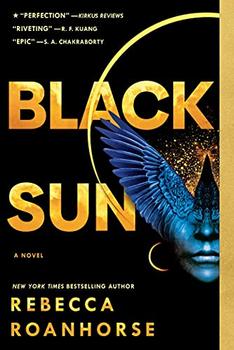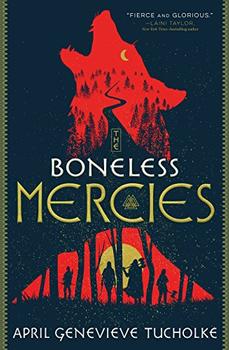Summary | Excerpt | Reviews | Beyond the book | Read-Alikes | Genres & Themes | Author Bio

The Aurelian Cycle Book 1
by Rosaria MundaInspired by classical political theory and the French Revolution, Rosaria Munda's YA debut Fireborne (the start of a planned trilogy called The Aurelian Cycle) is a unique, action-packed story of dragons, opportunity and political intrigue sure to please readers of all ages and genres.
There are dragons in Callipolis. Just a decade ago, only the aristocracy—the dragonlords and their families—were permitted to train and ride these creatures, using their power and their flames to rule over the serfs. But a bloody revolution brought death to the leaders and a new way of life to everyone else. Under Atreus, the First Protector, anyone who tests well enough has the opportunity to be chosen as a dragonrider. For Annie, whose family was murdered in the flames of dragonfire, riding is her way of embracing the new regime and escaping from her nightmares. Her natural ability and sharp instincts make her one of the best dragonriders, matched only by her friend and fellow orphan, Lee. Lee has been living a lie for the past nine years, and his secrets put him at odds with Atreus and the new regime, and possibly in danger. Flying is Lee's way of connecting with the family he lost, but as secrets are revealed, he must decide whether holding onto the past is worth sacrificing his future.
Fireborne is an epic fantasy that questions what it means to be truly loyal—to friends, to family and to one's native land. Annie and Lee have been loyal friends since their days at the orphanage, and as their skills earn them places among the ranks of dragonriders, that loyalty extends into their relationship as sparring partners and teammates. However, their bond is tested as truths they have chosen to ignore for years become secrets that could change the course of the nation. Annie knows Lee's true identity, that he was never a serf like most of the children at the orphanage. She has kept silent to protect him, but when survivors from the old regime return and threaten war, Annie is forced to choose between her allegiance to her homeland and her dearest friend. Lee must decide if he will stay loyal to the city he's sworn to protect or the family that he thought had been killed. Although their choices initially seem clear, Annie and Lee reevaluate their priorities as they learn painful truths about both the old and new regimes. The suspense builds as each new twist in the plot is revealed.
Munda's imaginative world-building also explores the growing pains of the new regime and the brutality of life with dragons. Despite the new class structure of society, there are still many who choose not to see beyond a person's past. Annie, a former serf, is discriminated against by her fellow dragonriders, her teachers and even some government officials. Many believe that Annie's naturally quiet and reserved personality is actually a reflection of her innate serf inclination to always follow rather than lead. Despite being one of the best dragonriders, these people don't believe that Annie could ever rise to the rank of Firstrider, the leader of the dragon armies of Callipolis, and some even actively discourage her attempts to attain this position. Other dragonriders face similar discrimination, especially from those whose families were formerly part of the ruling class.
These bullies make it clear that many don't truly believe in the new regime's values, and they demonstrate their frustrations at having to work and ride alongside former serfs not just with their words and their fists, but also with their dragons. This is a clever way to show the cracks in the seemingly ideal system of government. Numerous YA novels focus on the beginnings of revolution, but few feature the aftermath, and Munda has stepped into that gap to explore what happens after the fighting is done and everything isn't necessarily as happy and peaceful as people thought it would be.
The author vividly depicts the violence and trauma that can be inflicted by dragons on the general populace. The former dragonlords were responsible for many deaths, leaving some villages wary of the new regime. Though the new leaders claim to be different, they still use the dragons to make examples of those who rebel. And as the dragons are meant to be weapons of war, Munda shows the absolute devastation they have wrought. Unlike other books, like Anne McCaffrey's Dragons of Pern series, where dragons are characters with their own personalities and motivations, the dragons of Callipolis have little development and are almost solely characterized as living instruments of death. It's an interesting difference, and one that makes this a story with dragons rather than a story about dragons.
Instead, the emphasis is on the testing of these fierce friendships and loyalties in a world that is still struggling to adapt to a new regime. The action and ferocity of the dragon battles keep the pace moving, but it's truly Annie, Lee and their complex history that make Fireborne a fantastic beginning to this trilogy.
![]() This review was originally published in The BookBrowse Review in October 2019, and has been updated for the
January 2021 edition.
Click here to go to this issue.
This review was originally published in The BookBrowse Review in October 2019, and has been updated for the
January 2021 edition.
Click here to go to this issue.

If you liked Fireborne, try these:

by Rebecca Roanhorse
Published 2021
From the New York Times bestselling author of Star Wars: Resistance Reborn comes the first book in the Between Earth and Sky trilogy, inspired by the civilizations of the Pre-Columbian Americas and woven into a tale of celestial prophecies, political intrigue, and forbidden magic.

by April Genevieve Tucholke
Published 2020
Full of fierce girls, bloodlust, tenuous alliances, and unapologetic quests for glory, this elegantly spun tale challenges the power of storytelling - and who gets to be the storyteller.
Your guide toexceptional books
BookBrowse seeks out and recommends the best in contemporary fiction and nonfiction—books that not only engage and entertain but also deepen our understanding of ourselves and the world around us.